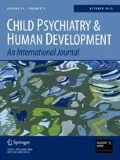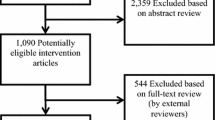Abstract
A brief primary care intervention for parents of preschool-aged children with disruptive behavior was assessed using a multiple probe design. Primary Care Triple P, a four session behavioral intervention was sequentially introduced within a multiple probe format to each of 9 families to a total of 10 children aged between 3 and 7 years (males = 4, females = 6). Independent observations of parent-child interaction in the home revealed that the intervention was associated with lower levels of child disruptive behavior both in a target training setting and in various generalization settings. Parent report data also confirmed there were significant reductions in intensity and frequency of disruptive behavior, an increase in task specific parental self-efficacy, improved scores on the Parent Experience Survey, and high levels of consumer satisfaction. All short-term intervention effects were maintained at four-month follow-up. Implications for the delivery of brief interventions to prevent conduct problems are discussed.




Similar content being viewed by others
References
Patterson G (1982) A social learning approach to family intervention: III. Coercive family process. Castalia, Eugene
Kazdin A (1991) Effectiveness of psychotherapy with children and adolescents. J Consult Clin Psyc 59:785–798
McMahon R, Wells K (1998) Conduct problems. In: Barkley R (ed) Treatment of childhood disorders, 2nd edn. The Guilford Press, New York, pp 111–207
Patterson G, Reid J, Dishion T (1992) Antisocial boys. Castalia, Eugene
Sanders M, Tully L, Baade P, Lynch M, Heywood A, Pollard G, Youlden D (1999) A survey of parenting practices in Queensland: implications for mental health promotion. Health Promot J Aust 9:112–121
Zubrick S, Ward K, Silburn S, Lawrence D, Williams A, Blair E, Robertson D, Sanders M (2005) Prevention of child behavior problems through universal implementation of a group behavioral family intervention. Prev Sci 6:287–304
Sanders M (2008) The Triple P-Positive Parenting Program as a public health approach to strengthening parenting. J Fam Psychol 22(4):506–517
Taylor T, Biglan A (1998) Behavioral family interventions for improving child-rearing: a review of the literature for clinicians and policy makers. Clin Child Fam Psych 1:41–60
Sanders M, Turner K, Markie-Dadds C (2002) The development and dissemination of the Triple P-Positive Parenting Program: a multilevel, evidence-based system of parenting and family support. Prev Sci 3:173–189
de Graaf I, Speetjens P, Smit F, de Wolff M, Tavecchio L (2009) Effectiveness of the Triple P Positive Parenting Program on parenting: a meta-analysis. Fam Relat 57:553–566
de Graaf I, Speetjens P, Smit F, de Wolff M, Tavecchio L (2008) Effectiveness of the Triple P Positive Parenting Program on behavioral problems in children: a meta-analysis. Behav Modif 32(5):714–735
Nowak C, Heinrichs N (2008) A comprehensive meta-analysis of Triple P-Positive Parenting Program using hierarchical linear modeling: effectiveness and moderating variables. Clin Child Fam Psych 11:114–144
Thomas R, Zimmer-Gembeck M (2007) Behavioral outcomes of parent-child interaction therapy and Triple P-Positive Parenting Program: a review and meta-analysis. J Abnorm Child Psyc 35:475–495
Turner K, Sanders M (2006) Help when it’s needed first: a controlled evaluation of brief, preventive behavioral family intervention in a primary care setting. Behav Ther 37(2):131–142
Bower P, Garralda E, Kramer T, Harrington R, Sibbald B (2001) The treatment of child and adolescent mental health problems in primary care: a systematic review. Fam Pract 18:373–382
Giel R, Koeter M, Ormel J (1990) Detection and referral of primary-care patients with mental health problems: the second and third filter. In: Goldberg D, Tantam D (eds) The public health impact of mental disorder. Hogrefe and Huber, Toronto, pp 25–34
Vasquez-Barquero J (1990) Mental health in primary care settings. In: Goldberg D, Tantam D (eds) The public health impact of mental disorder. Hogrefe and Huber, Toronto, pp 35–44
Nicholson J, French M, Oldenberg B, Connelly L (1997) Evaluation of the mental health service in rural and remote South West Queensland: final report for the Southern Queensland rural division of general practice. Queensland University of Technology, Brisbane
Sanders M, Dadds M (1982) The effects of planned activities and child management procedures in parent training: an analysis of setting generality. Behav Ther 13:452–461
Sanders M, Glynn T (1981) Training parents in behavioral self-management: an analysis of generalization and maintenance. J Appl Behav Anal 14:223–237
Sanders M, Christensen A (1985) A comparison of the effects of child management and planned activities training in five parenting environments. J Abnorm Child Psych 13(1):101–117
Huynen K, Lutzker J, Bigelow K, Touchette P (1996) Planned activities training for mothers of children with developmental disabilities: community generalization and follow-up. Behav Modif 20:406–427
Powers S, Roberts M (1995) Simulation training with parents of oppositional children: preliminary findings. J Clin Child Psychol 24(1):89–97
Sanders M, James J (1983) The modification of parent behavior: a review of generalization and maintenance. Behav Modif 7(1):3–27
Stokes T, Baer D (1977) An implicit technology of generalization. J Appl Behav Anal 10(2):349–367
Eyberg S, Pincus D (1999) Eyberg child behavior inventory and Sutter-Eyberg student behavior inventory—revised: professional manual. Psychological Assessment Resources, Odessa
Turner K, Sanders M, Markie-Dadds C (1999) Practitioner’s manual for primary care Triple P. Families International Publishing, Brisbane
Turner K, Markie-Dadds C, Sanders M (1999) Consultation flip chart for primary care Triple P. Families International Publishing, Brisbane
Sanders M, Markie-Dadds C, Turner K (1996) Positive parenting. Families International Publishing, Brisbane
Turner K, Markie-Dadds C, Sanders M (1996) Triple P tip sheet series for toddlers. Families International Publishing, Brisbane
Turner K, Markie-Dadds C, Sanders M (1996) Triple P tip sheet series for preschoolers. Families International Publishing, Brisbane
Sanders M, Markie-Dadds C, Turner K (1996) Every parent’s survival guide [Videotape and booklet]. Families International, Brisbane
Horner R, Baer D (1978) Multiple-probe technique: a variation of the multiple baseline. J Appl Behav Anal 11(1):189–196
Sanders M, Waugh L, Tully L, Hynes K (1996) The revised family observation schedule, 3rd ed. Parenting and Family Support Centre, The University of Queensland, Brisbane
Sanders M, Woolley M (2005) The relationship between maternal self-efficacy and parenting practices: implications for parent training. Child Care Hlth Dev 31(1):65–73
Garton A, Zubrick S, Silburn S (1995) The Western Australian survey: a pilot study. Aust NZ J Psychiat 29(1):48–57
Eyberg S (1993) Consumer satisfaction measures for assessing parent training programs. In: Van de Creek L, Knapp S, Jackson T (eds) Innovations in clinical practice: a source book. Professional Resource Press, Sarasota, pp 377–382
Sanders M, Markie-Dadds C, Tully L, Bor W (2000) The Triple P-Positive Parenting Program: a comparison of enhanced, standard, and self-directed behavioral family intervention for parents of children with early onset conduct problems. J Consult Clin Psych 68:624–640
Prinz R, Sanders M, Shapiro C, Whitaker D, Lutzker J (2009) Population-based prevention of child maltreatment: the US Triple P system population trial. Prev Sci 10(1):1–12
Acknowledgments
The research described in this paper was supported by grants U17/CCU422317 and 1R18CE001340 to Prinz and Sanders from the National Center for Injury Prevention and Control, Centers for Disease Control and Prevention. The findings and conclusions in this article are those of the authors and do not necessarily represent the views of the Centers for Disease Control and Prevention.
Author information
Authors and Affiliations
Corresponding author
Additional information
An erratum to this article is available at http://dx.doi.org/10.1007/s10578-014-0502-2.
Rights and permissions
About this article
Cite this article
Boyle, C.L., Sanders, M.R., Lutzker, J.R. et al. An Analysis of Training, Generalization, and Maintenance Effects of Primary Care Triple P for Parents of Preschool-Aged Children with Disruptive Behavior. Child Psychiatry Hum Dev 41, 114–131 (2010). https://doi.org/10.1007/s10578-009-0156-7
Received:
Accepted:
Published:
Issue Date:
DOI: https://doi.org/10.1007/s10578-009-0156-7




